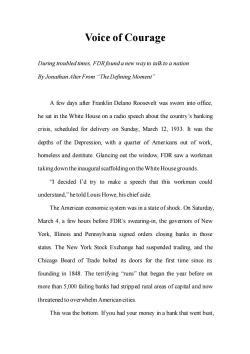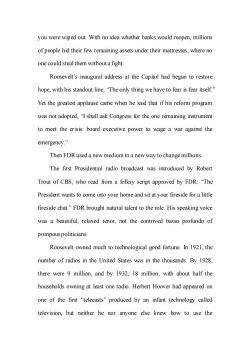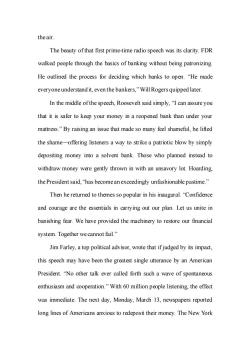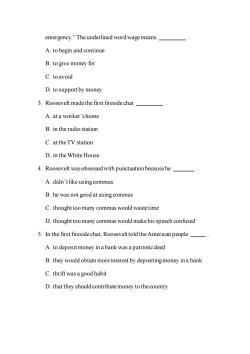私立华联学院:《英文报刊阅读》课程教学资源(练习题,十套)Voice of Courage政治人物_Voice of Courage

Voice of Courage During troubled times,FDR found a new way to talk to a nation By Jonathan Alter From"The Defining Moment" A few days after Franklin Delano Roosevelt was sworn into office. he sat in the White House on a radio speech about the country's banking crisis,scheduled for delivery on Sunday,March 12,1933.It was the depths of the Depression,with a quarter of Americans out of work, homeless and destitute.Glancing out the window,FDR saw a workman taking down the inaugural scaffolding on the White House grounds. "I decided I'd try to make a speech that this workman could understand,"he told Louis Howe,his chiefaide. The American economic system was in a state of shock.On Saturday, March 4,a few hours before FDR's swearing-in,the governors of New York,Illinois and Pennsylvania signed orders closing banks in those states.The New York Stock Exchange had suspended trading,and the Chicago Board of Trade bolted its doors for the first time since its founding in 1848.The terrifying "runs"that began the year before on more than 5,000 failing banks had stripped rural areas of capital and now threatened to overwhelm American cities. This was the bottom.If you had your money in a bank that went bust
Voice of Courage During troubled times, FDR found a new way to talk to a nation By Jonathan Alter From “The Defining Moment” A few days after Franklin Delano Roosevelt was sworn into office, he sat in the White House on a radio speech about the country’s banking crisis, scheduled for delivery on Sunday, March 12, 1933. It was the depths of the Depression, with a quarter of Americans out of work, homeless and destitute. Glancing out the window, FDR saw a workman taking down the inaugural scaffolding on the White House grounds. “I decided I’d try to make a speech that this workman could understand,” he told Louis Howe, his chief aide. The American economic system was in a state of shock. On Saturday, March 4, a few hours before FDR’s swearing-in, the governors of New York, Illinois and Pennsylvania signed orders closing banks in those states. The New York Stock Exchange had suspended trading, and the Chicago Board of Trade bolted its doors for the first time since its founding in 1848. The terrifying “runs” that began the year before on more than 5,000 failing banks had stripped rural areas of capital and now threatened to overwhelm American cities. This was the bottom. If you had your money in a bank that went bust

you were wiped out.With no idea whether banks would reopen,millions of people hid their few remaining assets under their mattresses,where no one could steal them without a fight. Roosevelt's inaugural address at the Capitol had begun to restore hope,with his standout line,"The only thing we have to fear is fear itself." Yet the greatest applause came when he said that if his reform program was not adopted,"I shall ask Congress for the one remaining instrument to meet the crisis:board executive power to wage a war against the emergency." Then FDR used a new medium in a new way to change millions. The first Presidential radio broadcast was introduced by Robert Trout of CBS,who read from a folksy script approved by FDR:"The President wants to come into your home and sit at your fireside for a little fireside chat."FDR brought natural talent to the role.His speaking voice was a beautiful,relaxed tenor,not the contrived basso profundo of pompous politicians. Roosevelt owned much to technological good fortune.In 1921,the number of radios in the United States was in the thousands.By 1928, there were 9 million,and by 1932,18 million,with about half the households owning at least one radio.Herbert Hoover had appeared on one of the first "telecasts"produced by an infant technology called television,but neither he nor anyone else knew how to use the
you were wiped out. With no idea whether banks would reopen, millions of people hid their few remaining assets under their mattresses, where no one could steal them without a fight. Roosevelt’s inaugural address at the Capitol had begun to restore hope, with his standout line, “The only thing we have to fear is fear itself.” Yet the greatest applause came when he said that if his reform program was not adopted, “I shall ask Congress for the one remaining instrument to meet the crisis: board executive power to wage a war against the emergency.” Then FDR used a new medium in a new way to change millions. The first Presidential radio broadcast was introduced by Robert Trout of CBS, who read from a folksy script approved by FDR: “The President wants to come into your home and sit at your fireside for a little fireside chat.” FDR brought natural talent to the role. His speaking voice was a beautiful, relaxed tenor, not the contrived basso profundo of pompous politicians. Roosevelt owned much to technological good fortune. In 1921, the number of radios in the United States was in the thousands. By 1928, there were 9 million, and by 1932, 18 million, with about half the households owning at least one radio. Herbert Hoover had appeared on one of the first “telecasts” produced by an infant technology called television, but neither he nor anyone else knew how to use the

broadcasting medium effectively Roosevelt,though,was different. All afternoon,workers busily removed the gold pieces and Presidential china patterns in the Diplomatic Reception Room on the White House ground floor.In came bulky electrical equipment and telephone cables,d to a desk and built-in microphone.Meanwhile Roosevelt pictured people "gathered in the parlor,listening with their neighbors,"wrote Frances Perkins,who witnessed many broadcasts,"As he talked,his head would nod and his hands would move in natural relaxed gestures.His face would light up as though he were actually sitting with people." The ritual went this way:Upstairs,FDR would put the finishing touches on every word and phrase.He was obsessed with punctuation. Grace Tully,his secretary,sometimes inserted extra commas when she typed,leading her boss to gently upbraid her for "wasting the taxpayers commas."His real concern was timing.He read aloud at 100 words a minute but he adjusted his pace for effect.At 6 p.m.,Roosevelt had his throat sprayed for a sinus problem.Then he enjoyed cocktails and dinner. Moments before the first Fireside Chat was to air,there was a crisis. No one could find his leather-bound reading copy.Panic ensued for everyone except FDR,who calmly picked up a smudged,mimeographed copy.After sipping from a glass of water,he read the words perfectly on
broadcasting medium effectively. Roosevelt, though, was different. All afternoon, workers busily removed the gold pieces and Presidential china patterns in the Diplomatic Reception Room on the White House ground floor. In came bulky electrical equipment and telephone cables, d to a desk and built-in microphone. Meanwhile, Roosevelt pictured people “gathered in the parlor, listening with their neighbors,” wrote Frances Perkins, who witnessed many broadcasts, “As he talked, his head would nod and his hands would move in natural, relaxed gestures. His face would light up as though he were actually sitting with people.” The ritual went this way: Upstairs, FDR would put the finishing touches on every word and phrase. He was obsessed with punctuation. Grace Tully, his secretary, sometimes inserted extra commas when she typed, leading her boss to gently upbraid her for “wasting the taxpayers’ commas.” His real concern was timing. He read aloud at 100 words a minute but he adjusted his pace for effect. At 6 p.m., Roosevelt had his throat sprayed for a sinus problem. Then he enjoyed cocktails and dinner. Moments before the first Fireside Chat was to air, there was a crisis. No one could find his leather-bound reading copy. Panic ensued for everyone except FDR, who calmly picked up a smudged, mimeographed copy. After sipping from a glass of water, he read the words perfectly on

the air. The beauty of that first prime-time radio speech was its clarity.FDR walked people through the basics of banking without being patronizing. He outlined the process for deciding which banks to open."He made everyone understand it,even the bankers,"Will Rogers quipped later. In the middle ofthe speech,Roosevelt said simply,"I can assure you that it is safer to keep your money in a reopened bank than under your mattress."By raising an issue that made so many feel shameful,he lifted the shame-offering listeners a way to strike a patriotic blow by simply depositing money into a solvent bank.Those who planned instead to withdraw money were gently thrown in with an unsavory lot.Hoarding. the President said,"has become anexceedingly unfashionable pastime." Then he returned to themes so popular in his inaugural.Confidence and courage are the essentials in carrying out our plan.Let us unite in banishing fear.We have provided the machinery to restore our financial system.Together we cannot fail." Jim Farley,a top political advisor,wrote that if judged by its impact this speech may have been the greatest single utterance by an American President."No other talk ever called forth such a wave of spontaneous enthusiasm and cooperation."With 60 million people listening the effect was immediate.The next day,Monday,March 13,newspapers reported long lines of Americans anxious to redeposit their money.The New York
the air. The beauty of that first prime-time radio speech was its clarity. FDR walked people through the basics of banking without being patronizing. He outlined the process for deciding which banks to open. “He made everyone understand it, even the bankers,”Will Rogers quipped later. In the middle of the speech, Roosevelt said simply, “I can assure you that it is safer to keep your money in a reopened bank than under your mattress.” By raising an issue that made so many feel shameful, he lifted the shame—offering listeners a way to strike a patriotic blow by simply depositing money into a solvent bank. Those who planned instead to withdraw money were gently thrown in with an unsavory lot. Hoarding, the President said, “has become an exceedingly unfashionable pastime.” Then he returned to themes so popular in his inaugural. “Confidence and courage are the essentials in carrying out our plan. Let us unite in banishing fear. We have provided the machinery to restore our financial system. Together we cannot fail.” Jim Farley, a top political advisor, wrote that if judged by its impact, this speech may have been the greatest single utterance by an American President. “No other talk ever called forth such a wave of spontaneous enthusiasm and cooperation.” With 60 million people listening, the effect was immediate. The next day, Monday, March 13, newspapers reported long lines of Americans anxious to redeposit their money. The New York

Stock Exchange closed for over a week,opened 15 percent higher,the largest one-day surge in more than halfa century.Within a week,most of the recently closed banks reopened. Gerald Ford,about 20 at the time,remembered FDR's Fireside Chats as "big events-we would all stop and listen."Ronald Reagan's biographer,Lou Cannon,has written that Reagan'smetaphors [were]the offspring of FDR's."And Bill Clinton recalled hearing his grandfather talk about how he sat in rapt attention,"then went to work the next day feeling a little different about the country." After the first Fireside Chat,FDR relaxed in his office.At 11:30 p.m. he said,"I think it's time for beer."Preparations for a bill to speed the end of Prohibition began that night Reading comprehension 1.According to the passage,which of the following is NOT true,at the beginningof 1933 in the U.S.? A.The unemployment washigh. B.The business ofbanks was bad. C.People lost confidence in the national economy D.It was in the war time. 2.In the sentence "..broad executive power to wage a war against the
Stock Exchange closed for over a week, opened 15 percent higher, the largest one-day surge in more than half a century. Within a week, most of the recently closed banks reopened. Gerald Ford, about 20 at the time, remembered FDR’s Fireside Chats as “big events—we would all stop and listen.” Ronald Reagan’s biographer, Lou Cannon, has written that Reagan’s “metaphors [were] the offspring of FDR’s.” And Bill Clinton recalled hearing his grandfather talk about how he sat in rapt attention, “then went to work the next day feeling a little different about the country.” After the first Fireside Chat, FDR relaxed in his office. At 11:30 p.m. he said, “I think it’s time for beer.” Preparations for a bill to speed the end of Prohibition began that night. Reading comprehension 1. According to the passage, which of the following is NOT true, at the beginning of 1933 in the U.S.? A. The unemployment was high. B. The business of banks was bad. C. People lost confidence in the national economy. D. It was in the war time. 2. In the sentence “…broad executive power to wage a war against the

emergency."The underlined word wage means A.to begin and continue B.to give money for C.toavoid D.to support by money 3.Roosevelt made the first fireside chat A.at a worker'shome B.in the radio station C.at theTV station D.in the White House 4.Roosevelt wasobsessed with punctuation because he A.didn'tlike usingcommas B.he was not good at using commas C.thought too many commas would wastetime D.thoughttoo many commas would make his speech confused 5.In the first fireside chat,Roosevelttold the American people A.to deposit money in a bank was a patriotic deed B.they would obtain more interest by depositing money in a bank C.thrift was a good habit D.that they should contribute money to the country
emergency.”The underlined word wage means . A. to begin and continue B. to give money for C. to avoid D. to support by money 3. Roosevelt made the first fireside chat . A. at a worker’s home B. in the radio station C. at the TV station D. in the White House 4. Roosevelt was obsessed with punctuation because he . A. didn’t like using commas B. he was not good at using commas C. thought too many commas would waste time D. thought too many commas would make his speech confused 5. In the first fireside chat, Roosevelt told the American people . A. to deposit money in a bank was a patriotic deed B. they would obtain more interest by depositing money in a bank C. thrift was a good habit D. that they should contribute money to the country
按次数下载不扣除下载券;
注册用户24小时内重复下载只扣除一次;
顺序:VIP每日次数-->可用次数-->下载券;
- 私立华联学院:《英文报刊阅读》课程教学资源(练习题,十套)Tragic End to Beslan Hostage Crisis恐怖主义_Tragic End to Beslan Hostage Crisis.docx
- 私立华联学院:《英文报刊阅读》课程教学资源(练习题,十套)The Gay-Marriage Flap; The Government Is out of Step with Public Opinion同性恋婚姻_The Gay-Marriage Flap; The Government Is out of Step with Public Opinion.docx
- 私立华联学院:《英文报刊阅读》课程教学资源(练习题,十套)Out of the Comfort Zone欧洲妇女面面观_Out of the Comfort Zone.docx
- 私立华联学院:《英文报刊阅读》课程教学资源(练习题,十套)Methane in Martian Air Suggests Life Beneath the Surface科技报道_Methane in Martian Air Suggests Life Beneath the Surface.docx
- 私立华联学院:《英文报刊阅读》课程教学资源(练习题,十套)Is Heart Surgery Worth It医学报道_Is Heart Surgery Worth It.docx
- 私立华联学院:《英文报刊阅读》课程教学资源(练习题,十套)Investment Fever in Clean-Energy经济投资_Investment Fever in Clean.docx
- 私立华联学院:《英文报刊阅读》课程教学资源(练习题,十套)Environmental Protection 环境保护全球变暖_Global Warming Threatens Deserts.docx
- 私立华联学院:《英文报刊阅读》课程教学资源(练习题,十套)A World View Must Be Part of School Culture教育报道_A World View Must Be Part of School Culture.docx
- 私立华联学院:《英文报刊阅读》课程教学资源(练习题,十套)A Tale of Two Cultrues文化报道_A Tale of Two Cultures.docx
- 私立华联学院:《英文报刊阅读》课程教学资源(练习题,十套)练习题十套的参考答案.docx
- 私立华联学院:《英文报刊阅读》课程教学资源(试卷)英文报刊阅读考卷A(含答案).doc
- 私立华联学院:《英语精读》课程PPT教学课件(A New English Course)Unit 9 University Days.ppt
- 私立华联学院:《英语精读》课程PPT教学课件(A New English Course)Unit 8 A Friend in Need.ppt
- 私立华联学院:《英语精读》课程PPT教学课件(A New English Course)Unit 7 From Composer to Interpreter to Listener.ppt
- 私立华联学院:《英语精读》课程PPT教学课件(A New English Course)Unit 6 The Pearl.ppt
- 私立华联学院:《英语精读》课程PPT教学课件(A New English Course)Unit 5 Antarctica.ppt
- 私立华联学院:《英语精读》课程PPT教学课件(A New English Course)Unit 4 Network Desinger——-Tim Berners-Lee.ppt
- 私立华联学院:《英语精读》课程PPT教学课件(A New English Course)Unit 3 Writing between the lines.ppt
- 私立华联学院:《英语精读》课程PPT教学课件(A New English Course)Unit 2 Salvation.ppt
- 私立华联学院:《英语精读》课程PPT教学课件(A New English Course)Unit 12 After Twenty Years.ppt
- 私立华联学院:《英文报刊阅读》课程教学资源(电子教案)Passage 1 Stay away from these(远离致命动物).doc
- 私立华联学院:《英文报刊阅读》课程教学资源(电子教案)Passage 10 Hong Kong's Occupy Central participants urged to reflect(香港‘占中’事件).doc
- 私立华联学院:《英文报刊阅读》课程教学资源(电子教案)Passage 11 Student calls for samesex marriage(中国大学生呼吁同性恋婚姻合法化).doc
- 私立华联学院:《英文报刊阅读》课程教学资源(电子教案)Passage 12 Death incites unrest(美国种族主义).doc
- 私立华联学院:《英文报刊阅读》课程教学资源(电子教案)Passage 13 Police seek motive in fatal Washington state school shooting(美国校园枪击案).doc
- 私立华联学院:《英文报刊阅读》课程教学资源(电子教案)Passage 14 Sitcoms mine the hardships of young adults worldwide(美剧《老友记》经典二十年).doc
- 私立华联学院:《英文报刊阅读》课程教学资源(电子教案)Passage 15 APEC promises to bring new prosperity(中国通过亚太经合组织会议承诺中国将带领各成员国共同发展繁荣).doc
- 私立华联学院:《英文报刊阅读》课程教学资源(电子教案)Passage 16 China Russia pledge to strengthen cooperation(中俄承诺加强合作).doc
- 私立华联学院:《英文报刊阅读》课程教学资源(电子教案)Passage 17 Travel agencies told to regulate tourist(中国将不文明旅客列入黑名单).doc
- 私立华联学院:《英文报刊阅读》课程教学资源(电子教案)Passage 2 Jackie Chan's son Jaycee faces being 'detained for six months'(名人吸毒).doc
- 私立华联学院:《英文报刊阅读》课程教学资源(电子教案)Passage 3 Klose calls it a day for Germany(德国国足克洛泽退役).doc
- 私立华联学院:《英文报刊阅读》课程教学资源(电子教案)Passage 4 Ebola kills more than humans(致命病毒埃博拉).doc
- 私立华联学院:《英文报刊阅读》课程教学资源(电子教案)Passage 5 Outbreak of fear(埃博拉引发恐慌).doc
- 私立华联学院:《英文报刊阅读》课程教学资源(电子教案)Passage 6 Obama leads US in remembrance of Sept 11 victims(美国911反恐纪念13周年).doc
- 私立华联学院:《英文报刊阅读》课程教学资源(电子教案)Passage 7 The big freeze(冰桶挑战).doc
- 私立华联学院:《英文报刊阅读》课程教学资源(电子教案)Passage 8 Alibaba jumps more than 40 percent in trading debut(阿里巴巴首次公开上市).doc
- 私立华联学院:《英文报刊阅读》课程教学资源(电子教案)Passage 9 'Gutter oil' scandal tarnishing Hong Kong’s reputation, says health secretary(食品安全:地沟油).doc
- 私立华联学院:《日语能力拓展》课程教学资源(参考资料)日本文化室资料_京都.ppt
- 私立华联学院:《日语能力拓展》课程教学资源(参考资料)日本文化室资料_广东料理(広東料理).pptx
- 私立华联学院:《日语能力拓展》课程教学资源(参考资料)日本文化室资料_日本历代天皇、将军、首相及其他_历代将军_历代征夷大将军(歴代の征夷大将軍).doc
